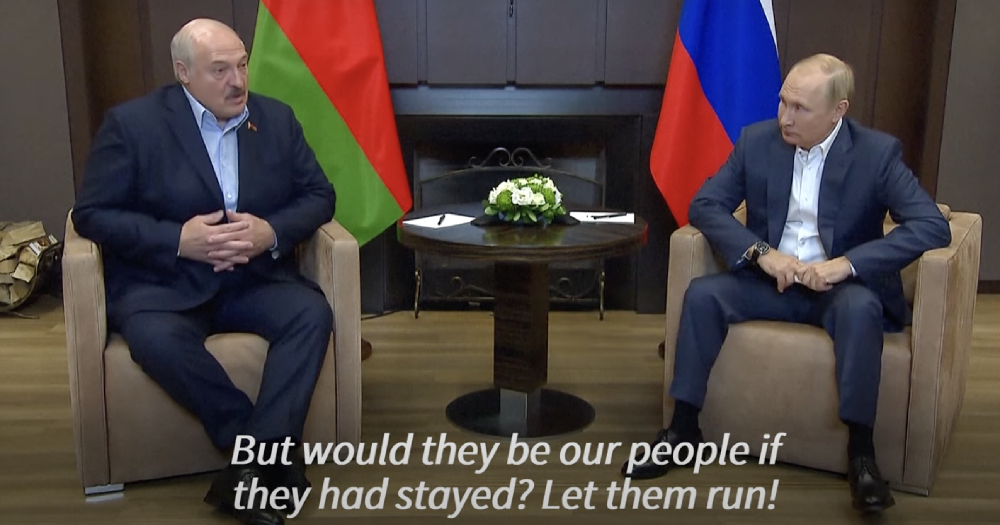Follow us on Telegram for the latest updates: https://t.me/mothershipsg
One of Russian President Vladimir Putin's last remaining international allies, the authoritarian Belarusian leader Alexander Lukashenko, told him that it's better to let Russian men fleeing from mobilisation go.
"Let them flee"
Lukashenko was speaking with Putin in Sochi on Sep. 26 during an informal meeting at the Bocharov Ruchei, which is the summer residence of the Russian president.
He said, according to a transcript released by the Kremlin, that the situation simply shows "who is who", and there is "nothing bad about this". He elaborated:
"Look, Russia can mobilise 25 million reservists. Alright, 30,000 to 50,000 people have fled. Would they side with us if they choose to stay? Let them flee."
Lukeshenko added that when "several thousand people left Belarus in 2020", he was "not very upset". And now, most of them are "asking for permission to come back".
Thousands of Belarusians started leaving the country in 2020 after the disputed reelection in August that year which saw Lukashenko staying in office as president for a sixth term with 80 per cent of the vote.
Many had left for fear of getting arrested after they took part in demonstrations and clashed with the riot police.
The number of asylum applications from Belarusians to European Union countries like Poland and Germany rose sharply in the months following the protests, according to statistics released by the EU.
Referring to the Russians who have fled or are thinking of doing so, Lukashenko said, "These people will also come back. However, we will need to decide what to do -- either let them come here or let them freelance there."
"Sorry for openly saying this. People should not act like this," he said, adding that it is possible to "reach an agreement here and not run away to Europe or America".
Several Russians fleeing to avoid conscription
Facing potential conscription, an estimated 200,000 Russian men have fled the country, according to figures released by neighbouring countries, such as Georgia, Kazakhstan and some EU countries.
The mass exodus has prompted a Russian lawmaker to say those of conscription age should not be allowed to travel abroad in the current situation, Reuters reported.
Countries bordering Russia subsequently barred Russian tourists from entering, with Finland being the last EU country that neighbours Russia to do so, following similar moves by Baltic states Estonia, Latvia and Lithuania.
The decision was taken partly as a response to widespread domestic support in Russia for the invasion of Ukraine.
Citing data that showed the majority of Russians support the war in Ukraine, Lithuanian Interior Minister Agne Bilotaite told AP "it is unacceptable that people who support the war can freely travel around the world, into Lithuania, the EU".
"Such support for hostilities can pose threats to the security of our country and the EU as a whole," she said.
A poll conducted in May 2022 by independent pollster in Russia, Levada Center, revealed that 77 per cent of Russians back the war, according to the Atlantic Council.
Putin's approval ratings have dropped
However, sentiments among the Russian people might have shifted slightly since Putin announced the mobilisation of 300,000 reservists to aid his war effort in Ukraine, according to Bloomberg, which cited a latest poll conducted by Levada Center shortly after the call-up.
As compared to February, more are worried that there would be a nationwide mobilisation, and there is an increase in the number of respondents who support peace talks than just a month ago. A larger percentage of respondents also said the war is not going well, as compared to April.
The poll results also show a drop in Putin's approval ratings, from 83 per cent to 77 per cent, The Moscow Times reported. This marks the second largest drop in his 23 years in power, with the last drop in 2018, when he raised the retirement age of Russian workers, sparking massive protests.
Top image via First Channel, National Radio of Belarus (subtitles added by The Sun)
If you like what you read, follow us on Facebook, Instagram, Twitter and Telegram to get the latest updates.
